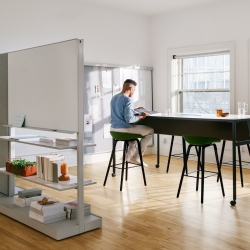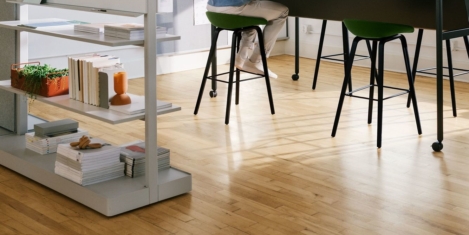To provide the best experiences, we use technologies like cookies to store and/or access device information. Consenting to these technologies will allow us to process data such as browsing behaviour or unique IDs on this site. Not consenting or withdrawing consent, may adversely affect certain features and functions.
The technical storage or access is strictly necessary for the legitimate purpose of enabling the use of a specific service explicitly requested by the subscriber or user, or for the sole purpose of carrying out the transmission of a communication over an electronic communications network.
The technical storage or access is necessary for the legitimate purpose of storing preferences that are not requested by the subscriber or user.
The technical storage or access that is used exclusively for statistical purposes.
The technical storage or access that is used exclusively for anonymous statistical purposes. Without a subpoena, voluntary compliance on the part of your Internet Service Provider, or additional records from a third party, information stored or retrieved for this purpose alone cannot usually be used to identify you.
The technical storage or access is required to create user profiles to send advertising, or to track the user on a website or across several websites for similar marketing purposes.
 Future Forum, a consortium launched by Slack with founding partners Boston Consulting Group, MillerKnoll and MLT has released the latest findings from its Pulse study, which shows that hybrid working has become the dominant work model for knowledge workers around the world. The report claims that the percentage of people working in hybrid arrangements has increased to 58 percent (from 46 percent in May 2021), as the share of workers who say their teams work exclusively either from home or from the office has declined sharply. (more…)
Future Forum, a consortium launched by Slack with founding partners Boston Consulting Group, MillerKnoll and MLT has released the latest findings from its Pulse study, which shows that hybrid working has become the dominant work model for knowledge workers around the world. The report claims that the percentage of people working in hybrid arrangements has increased to 58 percent (from 46 percent in May 2021), as the share of workers who say their teams work exclusively either from home or from the office has declined sharply. (more…)








 The events of the last 18 months have given us a once in a generation opportunity to reinvent work. Our generation can create a discontinuity between the assumptions of the past and the opportunities of the future. To capitalise on these opportunities though we have to dispense with the assumptions we hold about work and the places where work takes place, including many of the assumptions we hold about hybrid working. We have to re-examine the purpose of the office and what form it might conceivably take in the future before we can decide if it has any place in our plans.
The events of the last 18 months have given us a once in a generation opportunity to reinvent work. Our generation can create a discontinuity between the assumptions of the past and the opportunities of the future. To capitalise on these opportunities though we have to dispense with the assumptions we hold about work and the places where work takes place, including many of the assumptions we hold about hybrid working. We have to re-examine the purpose of the office and what form it might conceivably take in the future before we can decide if it has any place in our plans. 
 Keeping on top of communication barriers in the business world can feel like an endless game of Whac-A-Mole, especially now in the new era of hybrid working. The usual culprits are well-known by now: patchy WiFi connections, crashing computer programmes, cloud syncing issues, important emails sneaking into spam folders – the list goes on. All can impede our ability to get the job done.
Keeping on top of communication barriers in the business world can feel like an endless game of Whac-A-Mole, especially now in the new era of hybrid working. The usual culprits are well-known by now: patchy WiFi connections, crashing computer programmes, cloud syncing issues, important emails sneaking into spam folders – the list goes on. All can impede our ability to get the job done. 
 Four out of ten employers (42 percent) from across the UK have admitted they would likely seek to terminate an employees’ contract if they were homeless, despite nearly one in four households in England being at risk of or experiencing homelessness, claims a new report by
Four out of ten employers (42 percent) from across the UK have admitted they would likely seek to terminate an employees’ contract if they were homeless, despite nearly one in four households in England being at risk of or experiencing homelessness, claims a new report by 
 The majority of U.K workers (83 percent) believe that those who work remotely full time cannot meaningfully connect with workplace culture. Just 17 percent feel that time in the office is unnecessary for fostering company culture. These are the findings from
The majority of U.K workers (83 percent) believe that those who work remotely full time cannot meaningfully connect with workplace culture. Just 17 percent feel that time in the office is unnecessary for fostering company culture. These are the findings from 
 The majority (57 percent) of employers agree that the right to request flexible working should be a day-one right, claims research from the
The majority (57 percent) of employers agree that the right to request flexible working should be a day-one right, claims research from the 
 Seven in 10 (70 percent) of UK HR managers now say flexible working could work for their business – claims a new
Seven in 10 (70 percent) of UK HR managers now say flexible working could work for their business – claims a new 
 New research, ‘
New research, ‘
 A flexible work culture is a key consideration for the majority of young workers when choosing a job, with over half (53 percent) of 18-34-year-olds claiming that talented young people won’t join companies that are inflexible about the way their people choose to work.
A flexible work culture is a key consideration for the majority of young workers when choosing a job, with over half (53 percent) of 18-34-year-olds claiming that talented young people won’t join companies that are inflexible about the way their people choose to work. 
 Hybrid working could save the NHS more than £4 billion per year by giving workers more time to look after themselves and their families, according to a new study by
Hybrid working could save the NHS more than £4 billion per year by giving workers more time to look after themselves and their families, according to a new study by 








January 25, 2022
Hybrid working? Let’s put on a show
by Mark Eltringham • Comment, Flexible working